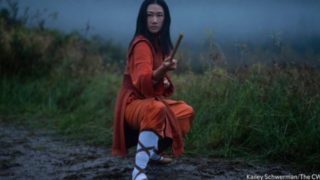A MAN WALKS wearily through a desert in the American West, remembering his combat training at a Shaolin monastery. He enters a saloon bar, orders a glass of water and waits for the confrontation he knows is coming. It happens quickly: another patron sidles up to the stranger and taunts him with racial slurs before reaching for weapons. The bigot is quickly dealt a flying kick to the stomach, and the stranger goes on sipping his drink.
“Kung Fu”, which had its premiere in October 1972, was the first show about martial arts on primetime American television. It was created by Ed Spielman, a comedy writer with a passion for Asian culture. As a teenager he had watched “Seven Samurai” (1954), Akira Kurosawa’s drama, and gone on to study Mandarin, kung fu and karate as an adult. He discussed the idea of writing a biopic of Miyamoto Musashi, a legendary Japanese swordsman, with Howard Friedlander, his friend and collaborator. Mr Friedlander suggested a Shaolin monk might make a more interesting protagonist, particularly if transposed to the Wild West.
Mr Spielman and Mr Friedlander pitched their film, entitled “The Way of the Tiger, The Sign of the Dragon”, to Warner Brothers. The studio liked the idea but, fearing it was risky, passed it to the television department. They greenlit the story of Kwai Chang Caine, a half-Chinese, half-American martial-arts expert who goes in search of his family, but the two writers parted ways with “Kung Fu” after the pilot episode. Television executives had auditioned several Asian actors, including Bruce Lee and George Takei, for the main part yet decided their accents would be impenetrable to American viewers. They hired David Carradine, a white actor with no martial-arts experience, for the lead role instead—a decision Mr Spielman disagreed with.
In spite of this misguided casting, “Kung Fu” helped start a craze for “chopsocky” in America (the moniker for action cinema produced in Hong Kong was coined by Variety). By the summer of 1973 “Kung Fu” had nearly 30m regular viewers. Noticing its popularity, distributors began importing martial-arts films and dubbing them into English. Three films—“Fists of Fury”, “Deep Thrust” and “Five Fingers of Death”—were hits at the box office concurrently, and “Enter the Dragon”, starring Bruce Lee, was one of the highest-grossing films that year. Marvel also sought the rights to adapt “Kung Fu” into a comic-book series. When their request was denied by Warner Communications (the parent company of DC Comics and Mad magazine), they created a character of their own, Shang-Chi.
A forthcoming film, “Shang-Chi and the Legend of the Ten Rings”, will be Marvel’s first live-action production with an Asian hero. At the same time, a new iteration of “Kung Fu” has achieved what Mr Spielman says he couldn’t 50 years ago. Warner Brothers approached Christina Kim, a screenwriter who worked on the hit series “Lost”, to develop a new version of the story with a predominantly Asian cast. Ms Kim grew up in Chicago as the daughter of Korean immigrants and remembers watching the original show: she knew that this was an opportunity to update the material, to showcase Asian-American actors and to offer a more nuanced portrayal of Shaolin kung fu. Mr Spielman, who is an executive producer, says that Ms Kim has given the idea “the dignity that it always deserved”.
The new protagonist, Nicky Shen (Olivia Liang), is a Chinese-American law-school dropout who learns martial arts in order to protect herself and the denizens of San Francisco. Familiar themes of immigration and generational divides are woven into the plot, as well as storylines about matchmaking, gentrification, addiction and abuse. “There are things that are relatable and I hope people see themselves in these characters and tune in,” Ms Kim says. “These characters are going through things that are shared issues and problems that everybody has, regardless of what ethnicity you are.”
The show has arrived at an important moment. The Centre for the Study of Hate and Extremism, a think-tank, found that hate crimes against people of Asian descent rose by nearly 150% from 2019 to 2020. In March a gunman killed six Asian women (and two others) at spas in Georgia. Vanessa Kai, who plays Pei-Ling, Nicky’s mentor, says that Asian women have historically been portrayed as submissive in popular culture. Shows such as this one have the freedom to portray strength instead.
“Kung Fu” is being broadcast in America on the CW network
By The Economist





